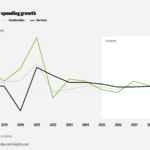The U.S. healthcare landscape is undergoing a radical transformation—and HealthTech startups are leading the charge. With rising healthcare costs, staff shortages, and demand for personalized care, the traditional medical model is being redefined by agile, tech-savvy disruptors.
In 2025, HealthTech isn’t just a trend—it’s a multi-billion-dollar innovation engine that spans telemedicine, AI diagnostics, wearables, virtual care, mental health, and personalized medicine. The convergence of healthcare and technology is making care smarter, faster, cheaper, and more accessible.
In this Growth Watch edition, we explore the top HealthTech startups in the U.S., what they’re solving, and how they’re driving growth and innovation in one of the most critical sectors of the economy.
The Rise of HealthTech: What’s Driving It?
1. Pandemic Legacy
COVID-19 accelerated digital adoption in healthcare. Patients embraced telehealth, remote monitoring, and online prescriptions—trends that continue in 2025.
2. Policy and Investment Momentum
- U.S. HealthTech VC funding crossed $35 billion in 2024
- Government pushing for value-based care, boosting innovation in cost reduction and preventive care
- HIPAA-friendly cloud platforms allow scalable data operations
3. Patient-Centric Demand
- Consumers demand convenient, real-time, tech-enabled services
- Rise of health-conscious Gen Z and Millennials
- Focus on mental health, women’s health, and chronic disease management
Key HealthTech Segments in 2025
| Segment | Growth Area |
|---|---|
| Telemedicine | Virtual consultations, urgent care, chronic condition monitoring |
| AI Diagnostics | Medical imaging, predictive analytics, personalized recommendations |
| Remote Monitoring | Wearables, smart devices, elderly care tech |
| Digital Therapeutics | App-based treatments for mental health, sleep, diabetes |
| Genomics & Precision Medicine | Personalized drug regimens based on DNA |
| Health Insurance Tech | Claims automation, real-time coverage plans |
| Mental Health | On-demand therapy, AI mental wellness apps |
Top U.S. HealthTech Startups Leading in 2025
Here’s a look at the most impactful HealthTech startups making waves in 2025.
1. Butterfly Network
- Founded: 2011
- Headquarters: Burlington, MA
- Category: Portable Ultrasound Imaging
What it does:
Butterfly iQ+ is a revolutionary handheld ultrasound device that connects to smartphones, replacing bulky traditional machines.
Why it’s thriving:
- Democratizes imaging access in remote and underfunded areas
- Used in ERs, ambulances, and even war zones
- AI integration helps non-specialists perform diagnostics
2025 Update:
- Partnered with Mayo Clinic and the VA Health System
- Deployed over 150,000 units globally
- Stock YTD growth: +31%
2. Tempus
- Founded: 2015
- Headquarters: Chicago, IL
- Category: Precision Medicine & Genomics
What it does:
Tempus uses AI and genomic sequencing to personalize cancer care. It collects and analyzes molecular and clinical data to guide treatment decisions.
Why it’s thriving:
- Supports oncologists with real-time, AI-driven insights
- Expanding into cardiology, infectious diseases, and mental health
2025 Update:
- Over 5 million patient records in its database
- Valued at $10 billion+ and preparing for IPO
- Backed by Google Ventures and Baillie Gifford
3. Carbon Health
- Founded: 2015
- Headquarters: San Francisco, CA
- Category: Hybrid Primary Care & Urgent Care
What it does:
Carbon Health operates clinics and telehealth services on a single tech-enabled platform. It aims to provide affordable, accessible, integrated care.
Why it’s thriving:
- Combines physical clinics with digital follow-ups
- Transparent pricing and insurance-friendly
- Real-time electronic health record (EHR) access for patients
2025 Update:
- 180+ clinics across the U.S.
- Raised $300M in Series F
- Exploring expansion into employer-based care
4. Cerebral
- Founded: 2020
- Headquarters: San Francisco, CA
- Category: Mental Health & Telepsychiatry
What it does:
Cerebral offers virtual mental health services, including therapy and medication for depression, anxiety, and ADHD.
Why it’s thriving:
- Addresses mental health crisis in the U.S.
- AI chatbot support for 24/7 check-ins
- HIPAA-compliant and licensed in all 50 states
2025 Update:
- Over 800,000 active users
- Partnered with employers to offer mental wellness benefits
- Launched teen-focused service line in 2025
5. Ginger (now part of Headspace Health)
- Founded: 2011 (Merged with Headspace in 2021)
- Headquarters: Santa Monica, CA
- Category: Digital Mental Health
What it does:
Ginger provides on-demand mental health coaching, therapy, and psychiatry via a smartphone app.
Why it’s thriving:
- Integrated behavioral health with meditation
- Employer-sponsored plans gain traction
- Offers same-day video therapy
2025 Update:
- Serving 2,000+ companies
- App downloads crossed 20 million
- Integration with wearables for real-time stress tracking
6. Hims & Hers Health
- Founded: 2017
- Headquarters: San Francisco, CA
- Category: Direct-to-Consumer Health
What it does:
Offers telehealth-based access to wellness, sexual health, dermatology, and mental health treatments via subscription.
Why it’s thriving:
- Affordable, discrete access to common treatments
- High consumer retention and brand loyalty
- Growing product line across wellness
2025 Update:
- Revenue projected to exceed $1.2 billion
- Partnerships with Walmart and Walgreens for delivery/pickup
- Expanded into weight-loss and women’s hormone health
7. Parsley Health
- Founded: 2016
- Headquarters: New York, NY
- Category: Holistic, Tech-Enabled Primary Care
What it does:
Focuses on root-cause medicine combining traditional care, functional medicine, and lifestyle coaching. Offered via subscription-based telemedicine.
Why it’s thriving:
- Personal health plans based on diagnostics and DNA
- Emphasis on prevention vs. reaction
- Subscription model provides high customer LTV
2025 Update:
- Operating in 10+ states
- Expanded employer benefits division
- Doubling down on hormone and autoimmune health
8. Color Health
- Founded: 2013
- Headquarters: Burlingame, CA
- Category: Population Genomics & Public Health
What it does:
Provides genetic testing and integrated health services to large populations, including governments, schools, and employers.
Why it’s thriving:
- Uses AI and data analytics to offer preventive health programs
- Enables early detection of chronic diseases and cancer
2025 Update:
- Partnered with the CDC and large hospital systems
- Introduced a national pre-cancer detection program
- Raised $400M to expand lab infrastructure
HealthTech Market Trends to Watch
1. AI + Data-Driven Care
- Startups leveraging AI in diagnostics, triage, workflow automation
- Examples: PathAI (pathology), Viz.ai (stroke detection), Aidoc (radiology)
2. Digital-First Care Models
- “Clinic in your phone” models gaining ground
- Virtual-first plans offered by payers and employers
3. Personalized Medicine
- Genetic testing + AI = Tailored treatments
- Startups like 23andMe and Invitae making DNA insights mainstream
4. Wellness and Prevention
- Digital coaching for lifestyle diseases (obesity, diabetes)
- Integration of wellness tracking, habit-building, and coaching
5. B2B Healthcare Tech
- Startups selling platforms to hospitals for:
- Scheduling
- Claims automation
- Interoperable EHRs
Investment Snapshot
| Year | U.S. HealthTech VC Funding |
|---|---|
| 2020 | $15.3B |
| 2022 | $29.1B |
| 2024 | $35.4B |
| 2025 (Est.) | $40B+ |
Top investors in the space:
- Andreessen Horowitz (a16z)
- General Catalyst
- GV (Google Ventures)
- Oak HC/FT
- Sequoia Capital
What Makes These Startups Succeed?
- Patient-Centered Design: Startups focus on ease of use, transparency, and access.
- Scalable Platforms: Cloud-native and mobile-first platforms allow rapid growth.
- Regulatory Awareness: Compliance with HIPAA, FDA approvals, and telehealth licensing.
- Strategic Partnerships: Collaborations with hospital systems, insurers, and employers.
- Data Utilization: Leveraging big data for diagnostics, personalization, and population health.
Conclusion: The Future of U.S. Healthcare Is Now
HealthTech startups are not just responding to change—they’re driving it. In 2025, these innovators are solving some of healthcare’s biggest problems with technology, vision, and purpose. From personalized treatments to mental health support and portable diagnostics, a new standard of care is emerging—one that is accessible, tech-driven, and patient-first.
Investors, clinicians, and consumers alike are fueling this transformation. As adoption grows, and infrastructure improves, the best HealthTech startups of today may become the healthcare giants of tomorrow.


